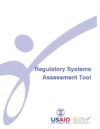
As the availability of pharmaceutical products in low- and middle-income countries (LMICs) has improved in recent years, the need for functional national regulatory systems is becoming paramount in ensuring the safety, quality, and efficacy of those products. However, national regulatory authorities in LMICs struggle to fulfill their respective mandates to meet this increasing demand for their services in line with international standards. Outdated legal frameworks, inadequate staffing, inefficient processes, weak information systems, and insufficient financing are among the challenges they face. Increasingly, donors and development agencies are acknowledging the importance of regulatory systems strengthening and are looking for ways to work with national regulatory authorities to define and prioritize their system needs, identify feasible evidence-based and cost-effective system strengthening interventions, and support regulatory authorities to monitor progress toward their goals. RSAT examines the system components and regulatory functions of a national medicines regulatory system. It can be implemented by either National Medicines Regulatory Agency (NMRA) staff for the purpose of self-assessment and monitoring or independent assessors and technical assistance providers that provide support to NMRAs to pinpoint and prioritize the specific areas of the regulatory system that most need improvement to achieve greater efficiency and effectiveness. The tool is designed to populate a combination of quantitative and qualitative data from multiple pre-existing sources.


